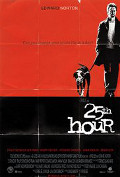
Directed by
Spike Lee
135 minutes
Rated MA
Reviewed by
Bernard Hemingway

25th Hour
Synopsis: The clock is ticking for Monty Brogan (Edward Norton). In 24 hours he starts a 7 year stretch in prison for drug-dealing. Once a kingpin, Monty has to say goodbye to the life he knows.
After his debut feature She’s Gotta Have It (1986), Spike Lee was dubbed the black Woody Allen. With Summer of Sam and now 25th Hour he might earn the sobriquet "The Black Martin Scorsese". In fact the opening titles to his latest film look like they’re an extension to the closing sequence of Scorsese’s Gangs of New York, which has modern day New York (pre 9/11) rising from its roots in Tammany Hall corruption and gangland violence. Another point of reference for them might also be Tim Burton's dystopian Gotham City in Batman (1989).
Lee, like Scorsese (and Allen but that’s another story) is a New Yorker, loves New York as the archetypal metropolis, dynamic and dangerous, and loves to tell stories about it. Just as Scorsese is known for his tales of Italo-American street-life, Lee has a comparable handle on life in the ‘hoods for Black Americans. 25th Hour is still about drugs and punks and even though Lee’s social perspective now incorporates white, middle class characters, the message is that they really shouldn’t be there. To live on the streets you’ve got to be of the streets.
I’m a big fan of Lee’s work, at least the decade 1986-1996. His strength was his ability to bring to the screen credible stories about life in areas like Harlem and Bedford-Stuyvesant. There were the historical pieces Jungle Fever and Malcolm X but they still dealt very much with black culture and a central concern to Lee, doing the right thing. With Girl 6 (1996), however, Lee, always creatively restless, began to diversify into smaller projects but not to great critical or commercial success. Of his subsequent films, that I am aware of, only Summer of Sam (1999) has had a theatrical release in Australia.
Without major cinema success in recent years, Lee has made a lot of his money from doing TV commercials for the big brands – Nike, Levis, Amex and so on as well as the American Navy (the armed forces are a major pathway out of the ghetto for a lot of black Americans). This is of relevance for two points. One, Lee is a very slick image maker and, two, his iconoclastic reputation notwithstanding, he is very much part of America’s consumer culture. Like Scorsese, Lee is an independent who works with the Hollywood moguls, he maintains his outsider perspective, yet in practice he is part of the mainstream entertainment industry. Both directors are susceptible to that peculiarly American problem, excess of everything.
The core of this movie is the story (well scripted by David Benioff from his own novel) of the central character’s coming-to-terms with his impending imprisonment – for a white kid with middle class values and a lot to lose this is a very uncomfortable prospect. Whilst there is a good deal of focus on the emotional angst for the parties concerned, protagonist, girlfriend, father, friends and so on, with strong performances from the cast Lee tends to overload the film with disco lights, babes in halter-neck tops, preening gangsters, bloodied faces and potty-mouthed dialogue - pretty much the de rigeur features of any megaplex Hollywood crime movie. Funnily enough, pretty much the same features you see in a Scorsese movie like Casino (and let’s mention here the stand-out Taxi Driver moment in Lee’s movie, with Norton in the De Niro part talking to the bathroom mirror as a montage of NY street life unspools).
Edward Norton, with his boyish charm, good an actor as he is, is no De Niro, and the candy-ass blandness that made him right in Fight Club doesn't fit well for a supposed big-time drug dealer, hugger-mugging with the club set and with a hot black girlfriend (Rosario Dawson) in tow. And one can't help but feel that Philip Seymour Hoffman really has got to move on from that sweaty, fumbling, socially inept character of his with which we are now over-familiar. Dawson is largely there for her looks and even probably the most memorable performance, by Barry Pepper as a slick, cynical stock market trader, is a well-established type. A lot of the characterisation is, in other words, derivative and external to the substantive issues here.
This also goes for the "American Empire" framing that the opening titles imply and which surface periodically, notably in the questionable extended dream sequence at the end,while the Stars and Stripes flutter proudly and Terence Blanchard’s stirring orchestral music endows proceedings with an impressive, if somewhat exaggerated, elegaic tonality. With Gangs Scorsese decided a-historically to leave the twin towers of the World Trade Center in his final image of New York. They are a significant absence here and form part of the insistent New York context. There is nothing inherently wrong with introducing these socio-cultural dimensions, perhaps even the reverse, but at least from a non-American perspective they seem here to be somewhat forced on the core story (there are 3 separate references to Osama Bin Laden) which wraps with a song from the master of pop patriotism, Bruce Springsteen
Its populist rhetoric notwithstanding 25th Hour is a strong film by a master film-maker.

Want more about this film?


Want something different?




